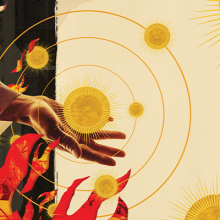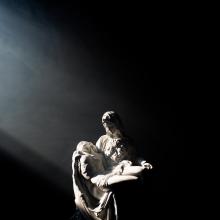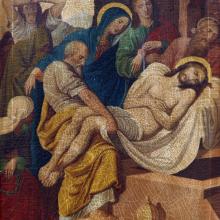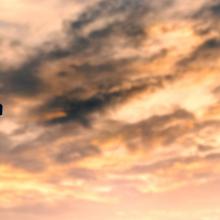Holy Saturday
A CENTURY AGO, the baseball-player-turned-evangelical-revivalist Billy Sunday preached a gospel supercharged by conspiracy theory and nationalism. He spoke against the backdrop of World War I to masses seized by national security anxiety directed at immigrant communities. Deploying a message made urgent and relevant by its conspiratorial frame, Sunday preached, “They call us the ‘melting pot.’ Then it’s up to us to skim off the slag that won’t melt into Americanism and throw it into hell or somewhere else.”
Hellish rhetoric has a long history in the United States for animating theological paranoia in service of supremacist political power. It’s also been part and parcel of American evangelicalism.
Like many kids growing up in evangelical culture in the 1990s, I was extremely familiar with hell. Popular preaching led with hell before it ever spoke of heaven. It described a place of terror reserved for the unbelieving, who always happened to be from the wrong political party or country. In those days, evangelical churches hosted so-called hell houses to “scare straight” teenagers who strayed from a very narrow moral code. My own church did annual dramas depicting people in hell. I prayed the “Sinner’s Prayer” more times than I could count, hoping I really meant it enough to save me for good. If you were to ask me then: “Do you believe in hell?” I would have said “Of course! I’m a Christian!” Belief in hell went hand in hand with belief in Jesus.
My faith today requires me to dismantle the understanding of hell I received as a child and the cultural use of hell popular today in the rise of Christian nationalism. Hell, in the Trump era, is a rogue theological element, unmoored from the Christian story. When Donald Trump says, “I want to make the country great again. This country is a hellhole,” he casts himself, theologically, in the role of Christ, dispensing judgment on who is good and who is bad.
Trump wields diabolical power to throw people to political hells — and that’s what he’s doing. This isn’t new. Poet Langston Hughes wrote prophetically in 1936, “Fascism is a new name for that kind of terror the Negro has always faced in America.”
In this stream of prophetic thought, we are roused to consider our own responsibility today. We cannot look away from the political hells rising up around us, including indiscriminate ICE raids at churches; repurposing the Guantanamo Bay detention camp to hold migrants; freezing funding for critical family services and health programs in the U.S. and around the world; dispossessing hundreds of thousands of civil servants from their livelihood; and blocking asylum access for those in fear for their lives — all creating indescribable suffering for those who don’t fit a very narrow white supremacist or libertarian agenda.
FROM SOJOURNERS’ OFFICE in Washington, D.C., we can almost hear shattering glass from Elon Musk’s smash-and-grab looting spree of the U.S. Treasury Department and his dodgy gang’s rampage through national security statutes, privacy rights, and the Constitution. Amid the weaponized sturm und drang, people’s lives are dangerously upended. José Humphreys III recalls Jesus weeping over Jerusalem while self-identifying as a hen protecting her little ones; that feels too timely.
For our cover feature, associate editor Josina Guess interviews retired Episcopal priest and author Barbara Brown Taylor. Both live on small farms in north Georgia. Their conversation covers goats, neighborliness, and Good Friday. (Chickens, too.) Jared Stacy picks up Holy Week themes in a provocative essay contrasting Christ’s harrowing of hell, remembered by the church on Holy Saturday, with Trumpian saviorism today.
While we defiantly “sweep up the glass” through heightened political pressure, solidarity with the vulnerable, and the risk of arrest for following Jesus, we know that we are in, as Guatemalan poet Julia Esquivel wrote, a “marathon of Hope.”
We need to walk together, day by day, through the days of this holy weekend — in the midst of this modern plague. Here I offer my map for that journey.
Our bodies, entombed and separated from each other by our social distancing efforts, will be stuck in Saturday.
In the midst of so much death, how can we Christians celebrate Easter?
These questions can be paired with questions regarding our own sense of worship on that day. How much have we Christians replaced justice with worship, not taking one into serious relation with the other? Are we accustomed to worship in the total absence of justice?
I drove by a church last week, a few days before Palm Sunday, and read their sign: CHRIST HAS RISEN!
Um, no. No he hasn’t. In the Christian calendar he hasn’t even died yet. But this is an all-too-common phenomenon in Christian Churches.
Why?
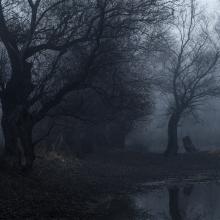
Photo via prudkov / Shutterstock
Every Christian knows the story: Jesus was crucified on Good Friday and rose from the dead on Easter Sunday. But what did he do on Saturday?
That question has spurred centuries of debate, perplexed theologians as learned as St. Augustine and prodded some Protestants to advocate editing the Apostles' Creed, one of Christianity's oldest confessions of faith.
Roman Catholic, Eastern Orthodox and most mainline Protestant churches teach that Jesus descended to the realm of the dead on Holy Saturday to save righteous souls, such as the Hebrew patriarchs, who died before his crucifixion.
